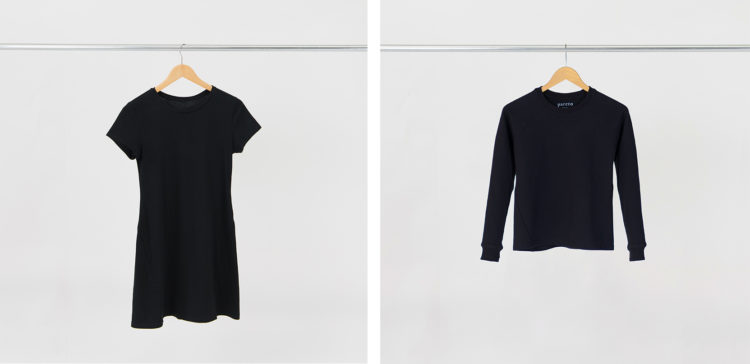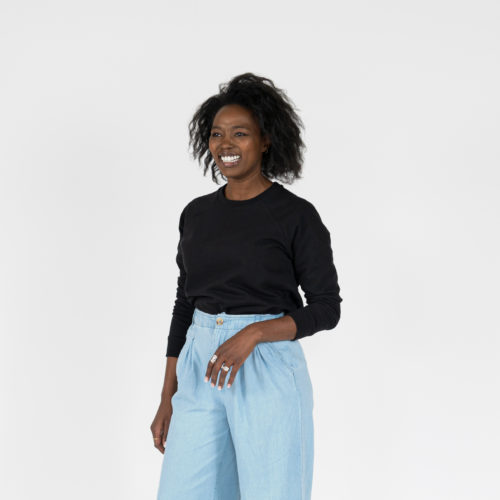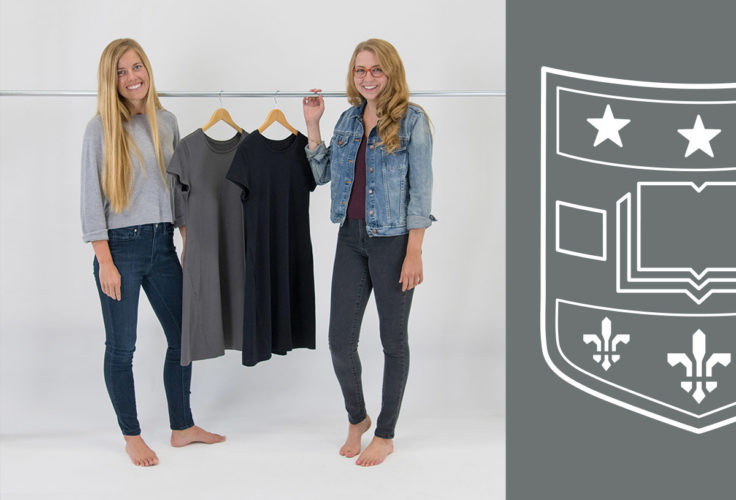Leaving her full-time, stable job to take a leap into entrepreneurship the day before a national shutdown isn’t what Jessica Landzberg (right), BSBA ’17, imagined for herself. But she and Olivia Bordson (left), BSBA ’15, are redefining the women’s clothing industry—and they couldn’t be happier with how it’s going.
After their respective graduations from WashU, Landzberg and Bordson each spent years working for traditional retail brands. But, Landzberg explained, “we started to feel disenchanted by this industry that we thought we’d be working in for the long run.”
Landzberg and Bordson found themselves in an endless cycle of “more”—more product, more new ideas, more frequent brand launches. It was uninspiring, frustrating and—perhaps worst of all—wasteful.
Enter Pareto: a new venture from the Olin grads that seeks to make the best versions of the clothes women wear. Named for the Pareto Principle, an economic phenomenon remarking on the incongruence of causes and effects, the shop operates on the assertion that women tend to wear 20% of their closet 80% of the time.
This realization, confirmed by speaking with friends and other women in their lives, “pushed us to take the leap and start our own company.”
A deliberate, thoughtful launch
Bordson and Landzberg are doing things intentionally, taking their time and releasing pieces that are built to last, comfortable and made with an all-American, short supply chain. They started on August 20, 2020 with a traditional T-shirt dress that can be dressed up or down. On November 20, they launched addition No. 2: a comfortable, durable crew neck sweater.

“If you have a really great T-shirt dress and a really great crew neck sweater, that already solves a ton of your wardrobe needs,” Bordson explained.
The COVID-19 pandemic wasn’t part of the plan—and it had the potential to change everything. But, in fact, the pair see the pandemic as simply accelerating what they already predicted.
“Long before today, we started to see this scary but inevitable reevaluation of what ‘normal’ looked like in consumerism,” Landzberg explained. “There’s this juxtaposition between industry actors who force brands to rely on endless product development, and consumers who are starting to question whether they really need to endlessly buy more.”
Anticipating a consumer trend?
The pandemic and resulting economic scares accelerated this reevaluation; in-store shopping came to a halt, and brands started to face harsh financial realities as consumers rethought their buying habits. The pair imagined that a brand focused on simple, sustainable and basic pieces meant to last could be the solution.
And that solution is rooted in a rethinking of growth, defined through values-based, data-driven habits. “We’re telling our community a story about every hand that has touched each one of our pieces,” Bordson explained.
That’s not an easy way to do business—and plenty have said so along the way. Bordson and Landzberg know their focus on sustainability, creating fewer, more purposeful pieces and making each of those pieces perfect is more expensive and time consuming. But with a capital-efficient model and a focus on what the consumer wants, they’re confident in their success.

So far, that’s been working for them: the company sold through 75% of their inventory in the first month post-launch. Bordson sees this as just the beginning: “We have an amazing, diverse set of customers from 20+ states. Many who initially bought the T-Shirt Dress in black already came back and bought it in gray because they found themselves wearing it day after day. That’s the best measure of success for us!”
“Growth doesn’t have to come from more product, more often,” Landzberg explained. “We’re going to be deliberate in the way we grow while staying true to our core mission. We’re excited to rewrite the playbook on what growth means.”



